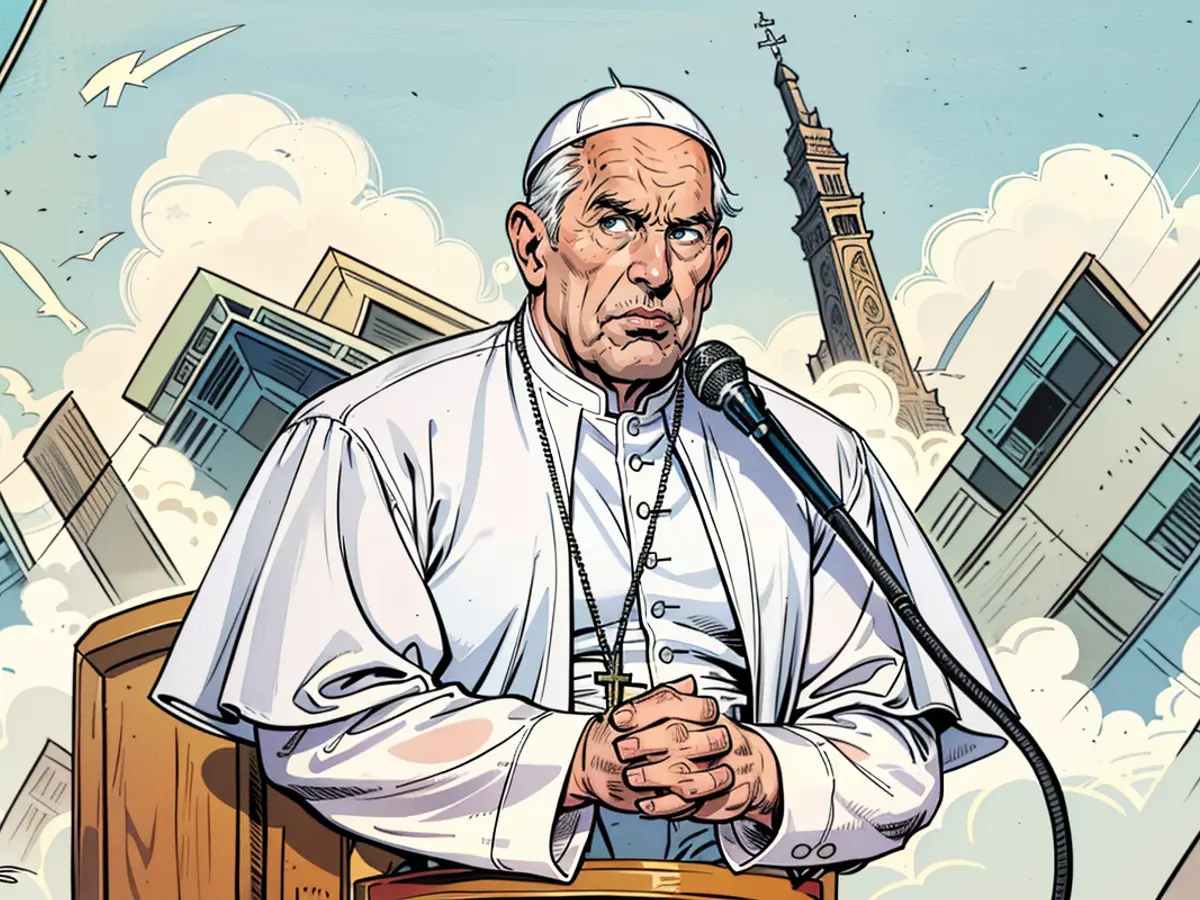Pope Francis believes the Church should have a role in the global discussion among political figures on artificial intelligence.
Pope Francis is all set to make a historic intervention at the G7 summit in Puglia, Italy, this week. Being the first Pope to participate in a summit of leaders from the world's most advanced economies, he will join a session dedicated to AI. The likes of US President Joe Biden, a Catholic who shares a warm relationship with the pontiff, are expected to be present at the gathering.
At 87, the Pope is determined to exercise his soft power to ensure that the development of AI serves humanity and doesn't turn into a Frankenstein's monster. Fresh out of his youthful training as a chemist, he welcomes scientific advancements but foresees grave risks. To prevent AI from becoming a 21st-century nightmare, the Pope warns of a "technological dictatorship" if proper regulation is not put in place, fearing the dangers of AI-controlled weapons and the potential for technology abuse, resulting in a surveillance society and interference in elections. He believes AI has the potential to make the world a better place but only if it prioritizes the "common good" and doesn't widen inequalities.
The Vatican has been in the forefront of pushing for an ethical framework for AI. Since 2020, the Pontifical Academy for Life, a global advocate for Catholic moral teachings on bioethics, has been spreading the word about the "Rome Call for AI Ethics." This document outlines six principles for AI ethics that emphasize transparency, inclusion, responsibility, and impartiality. The Vatican is seeking the support of big tech companies and governments - Microsoft (MSFT), IBM (IBM), Cisco Systems (CSCO), United Nations' Food and Agriculture Organization, Italy's innovation ministry, and religious leaders have already signed it.
Francis expects world leaders to come together and regulate AI during the G7 summit, echoing his call for a global treaty last year. The European Union, Giorgia Meloni, Italy's Prime Minister, has already put regulations in place, and a bipartisan group of US senators has also proposed AI regulations that may lead to federal legislation.
Father Paolo Benanti, a Franciscan friar and professor who works with the Vatican on AI, predicts that the Pope will emphasize the humanitarian aspect of AI at the G7. He is concerned about AI's impact on inequality and misinformation in the public square. Moreover, the Pope recognizes the "great challenges facing humanity" and has already addressed issues like migration and climate change.
Scientific advances can lead to numerous ethical dilemmas, and the Pope is not an engineer, but he does worry about the social aspects and implications of AI. Father Benanti, also a member of a UN advisory body on AI, also thinks the Pope's primary focus will be on topics like AI's threat to increasing inequality and public information reliability.
Archbishop Vincenzo Paglia, president of the Pontifical Academy for Life, echoes the need for international regulation to prevent misuse of AI, stating that only such oversight can curb abuses and create a sustainable future.
Italy, currently holding the rotating presidency of the G7, had previously banned ChatGPT over privacy concerns and plans to penalize AI abuse. Meloni, Italy's Prime Minister, believes the Pope's presence in Puglia will "give a decisive contribution to drawing up an ethical and cultural regulatory framework" for AI. She emphasizes the importance of gathering global ethical and intellectual perspectives to navigate the challenges of this technology. The G7 looks to be the platform for discussions on "algorethics," essentially, AI ethics.
Papal adviser Father Antonio Spadaro, in a recent post on the digital platform X (formerly Twitter), notes that Francis' decision to take part in the G7 shows his desire to engage with the world rather than retreat from it, potentially setting the tone for the event.
Father Philip Larrey, the author of a book on AI and former dean of the Philosophy Department at the Pontifical Lateran University in Rome, calls the Pope's decision to attend a "surprising" move, but one he believes will significantly influence the summit's direction and outcome.
"AI and evolving innovations are on Pope Francis' radar," informed Larrey, currently a philosophy teacher at Boston College. "He intends to utilize the power of the Catholic legacy to emphasize the necessity of contemplating AI's ethical consequences. The fact that he's present in Puglia testifies to the severity of his message, which often involves 'person-centered AI' as an example."
The profoundly misleading image of the pope in a puffer coat has served as a landmark in AI advancements and deceptive visuals, demonstrating the potential of technology to alter images.
Francis brought up this issue when he cautioned earlier this year about disinformation and the dissemination of images that "seem feasible but untrue." He reminded everyone, "I've also been affected by this."
Papal appearances in fake deep-generated images have been circulating, depicting him skateboarding, on a motorcycle, and even mimicking the Burning Man festival in Nevada.
It's evident that Francis perceives AI as an inseparable part of what he deemed to be the "epochal shift" occurring at the start of the 21st century.
His presence at the G7 gathering represents his ambition to place the Catholic Church at the epicenter of deliberations relating to the development of this transformation and to ensure that AI's benefits are universally experienced.

Read also:
The Church's role in the global AI discussion extends to engaging with tech businesses, as Pope Francis emphasizes the need for ethical frameworks and regulations to prevent AI from becoming a threat to humanity.
In a bid to ensure AI serves the common good, Pope Francis calls on big tech companies and governments to prioritize ethical principles in AI development.








